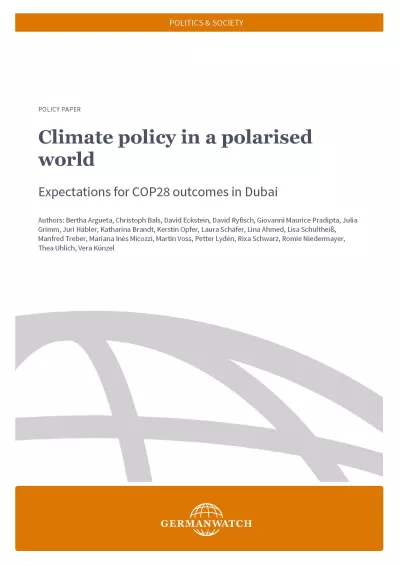Climate policy in a polarised world

This is the executive summary of the Germanwatch paper on burning issues at COP28.
For the second year in a row, the UN Climate Talks are overshadowed by violent conflict. In 2022 world affairs were dominated by the Russian invasion of Ukraine. This year, it is the conflict in Israel and Gaza that threatens to influence the proceedings at COP. Beyond concerns regarding safety at the conference – which the organisers have sought to eliminate – the political exploitation of COP28 is a clear risk. It could exacerbate the growing polarisation between signatory states. To be sure, there are already major tensions between Western nations and some Middle Eastern actors, particularly Iran. As the fighting in Gaza is likely to be ongoing at the start of the conference, this could well impact negotiations in Dubai.
Fossil fuel companies and states saw record profits in 2022 and they continue to rake in billions from the extraction and sale of fossil fuels, despite their central role in contributing to the climate crisis. Rather than funnel these record revenues into sustainable transitions, fossil fuel companies and states are also using them to develop new oil and gas fields while engaging in lobbying efforts to protect their economic interests. Furthermore, some fossil fuel states – including Iran, Russia, and Saudi Arabia – have been using these revenues to finance armed conflict and/or the violation of human rights. The fossil fuel lobby exerted a significant impact on the deliberations at COP27, and there are fears its influence will be even stronger this year under the presidency of the United Arab Emirates (UAE). Hopefully, this conference will represent the last attempt by the oil, gas, and coal lobby to keep the fossil-fuel economic model alive. Renewable energy, batteries, heat pumps, and electric vehicles are achieving ever greater adoption; the end of the fossil fuel era draws closer with each passing year. The energy policy debate at COP28 will be marked by the negotiation of targets for expanding renewable energy, enhancing energy efficiency, and phasing out coal, oil, and natural gas.
The world is increasingly characterised by growing polarisation between the US and China. This is sure to influence events at COP28. Both China and the US are trying to draw countries into their respective spheres of geopolitical influence. The US, for example, is hoping to draw India away from China; a new trade initiative announced by the G20 will develop a network of shipping and rail lines to connect India with the Gulf States, Middle East, and EU. China, by contrast, has been moving to expand the BRICS group (including so far Brazil, Russia, India, China, and South Africa). Egypt, Argentina, Ethiopia, Iran, Saudi Arabia, and the UAE have all been invited to join. At the end of this year’s G20 summit in India, the G20 managed to adopt a final communiqué and also a communiqué of the G20 finance ministers – despite obstructionism by Russia and China. This was a success over last year’s G20 in Indonesia, when no final communiqué was adopted. This year’s G20 summit thus sent an important signal for multilateralism – and also for the coming World Climate Summit.
The success of the summit in Dubai will depend in no small part on whether a broad-based High Ambition Coalition (HAC) emerges that can exert the necessary pressure on major emitters with regard to climate protection, adaptation, and financing. The major emitters are predominantly the G20 countries, especially the US and China, which together account for 81% of global emissions and relatively equal shares of global wealth. It is disappointing that Germany did not sign the statement issued by the emerging HAC, neither at the UN General Assembly summit in New York, nor at the pre-COP at the end of October.
The UAE presidency hopes to organise the largest COP ever, and is highly determined to make the conference an international media success. Accordingly, in addition to successful negotiations, the UAE is planning to launch several political initiatives of its own. Nevertheless, the UAE has come under criticism. The country’s per capita GHG emissions and wealth are among the highest in the world, and its climate targets remain weak. The UAE sits atop some of the largest oil and gas reserves in the world, and these reserves have made the country incredibly wealthy. The UAE continues to develop and finance new oil and gas fields at home and abroad. The human rights situation in the UAE remains dire, as there are numerous cases of arbitrary detention, and significant restrictions on freedom of expression.
Points of political impasse
The first global stocktake (GST) – which began at COP26 in Glasgow – will end at COP28 in Dubai. Every five years, the GST reviews the progress made by signatory states in implementing the Paris agreement. Specifically, the GST examines collective progress achieved, long-term goals, and the core elements: climate mitigation and adaptation measures, associated funding requirements and finance flows. A key aim of the GST is to make countries submit more ambitious Nationally Determined Contributions (NDCs) before COP30. The influence that the GST will exert on climate ambition in the coming years will crucially depend on the ambition and strength of the political messaging. This first GST will set the benchmark for future stocktakes, which will recur every five years. In this way, it will play an important role for the achievement of targets set by various nations for 2030. The first GST should not culminate in a mere exchange of information. Rather, it should be harnessed to encourage ambitious and transformative climate policy.
- A commitment to the fossil fuel phase-out: A rapid, fair, and complete phase-out of coal, oil, and natural gas across all sectors, including the elimination of fossil fuel subsidies. If the 1.5°C limit is to remain within reach, fossil fuel use will need to be cut in almost half by 2030.
- A commitment to the massive expansion of renewable energy: The international community should set a target for the socially equitable tripling of clean and reliable RES capacity to over 11,000 gigawatts by 2030, and to set a target for doubling the annual rate of improvement in energy efficiency by 2030.
- A commitment to climate finance: The annual rate of investment in sustainable energy must quadruple by 2050. Rich countries with high emissions should take particularly strong action to assist poorer developing countries, e.g. through furnishing financial resources, technology transfer, and capacity building.
The intensification of the climate crisis is making adaptation measures increasingly important, as evident once again in 2023, an El Niño year. Adaptation measures are crucial for building resilience and coping with negative impacts, both now and in the future. Increasing the ability of counties to adapt to climate change is one of the three long term goals of the Paris agreement. The Global Goal on Adaptation (GGA) seeks to:
- enhance the world’s adaptive capacity,
- strengthen resilience, and
- reduce vulnerability to climate change.
The extent to which a consensus can be reached on these issues will be seen at the first days of COP28 . In the view of Germanwatch, targets, sub-targets, and performance indicators need to be specific enough to guide adaptation measures. At the same time, it should be possible to evaluate these targets and indicators as climate change progresses, and to flexibly adjust them depending on the severity of climate change impacts.
Yet adaptation will not be possible for all impacts. Indeed, climate change is already causing unavoidable loss and damage. Accordingly, a decision should be taken at COP28 to operationalise the new Loss & Damage Fund (L&D Fund), and to launch the necessary steps for its funding so that it can support affected countries and people as quickly as possible. Progress in this regard will be essential for rebuilding trust. Important aspects of the L&D Fund negotiations at COP include:
- Who will contribute to the fund? In the view of Germanwatch, the industrialised countries must take the lead in capitalising the fund. Due to their historical emissions, industrialised countries still bear primary responsibility for the climate crisis. In accordance with the dynamic interpretation of the polluter-pays principle in combination with the principle of Common But Differentiated Responsibilities and Respective Capabilities (CBDR-RC), rich emerging economies should also contribute to L&D financing and to the fund. This includes oil and gas exporting countries and China. (China is by far the largest absolute emitter, but has historically contributed less per capita to the climate crisis than industrialised countries.)
- Who can access the L&D Fund? In the view of Germanwatch, L&D funding should be provided first and foremost to vulnerable countries, communities, and people.
- How big should the fund be? While a decision has been made to launch an L&D Fund, this decision does not identify the scope of the financial resources required to deal with loss and damage. Certainly, hundreds of billions will be required. Some researchers estimate that $580 billion will be needed to cover loss and damage in developing countries from 2030 onward.
- How should the fund be managed organisationally? The Board of the L&D Fund should operate in line with the Paris agreement and UNFCCC principles. This includes equal representation of the Global North and South. According to the agreement reached at COP27, the Board is to consist of 14 members from developing countries and 12 members from developed countries. The agreement also foresees the participation of civil society representatives at Board meetings (a minimum requirement in the view of Germanwatch).
Clarification of the above issues is essential for the fund to begin operation. If it is not possible to reach a decision on all points at COP28, then the Board should be established and empowered to clarify any remaining unresolved issues. At COP28 it will also be important to obtain sufficient funding commitments. However, an important prerequisite in this regard is to clarify which countries are to contribute to the fund.
Negotiations are also sure to be challenging with regard to financing for mitigation and adaptation. The industrialised countries previously agreed to provide $100 billion per annum in public and private funding from 2020 onward to support climate protection and adaptation in poorer countries. However, only $83.3 billion was mobilised in 2020. To build confidence among participants at COP28, it will be important to present credible evidence that the $100 billion climate finance target was achieved in 2023 (despite the fact that relevant data will not be available until 2025, due to data requirements and reporting procedures).
COP26 marked the start of negotiations on the new climate finance target for the period after 2025. This target is referred to as the New Collective Quantified Goal (NCQG). A final decision on the NCQG will not be made until 2024. However, this decision already looms large on the horizon. In their ‘high-level dialogues’, the ministers at COP28 will at a minimum need to indicate where they see potential for consensus on the NCQG, including the path to a successful agreement in 2024. In this way, COP28 will play an important role in preparing for the decisions taken next year. If the Paris targets are to remain within reach, it is necessary at a technical level to lay the groundwork for a massive increase in funding. This includes the need to extend the list of revenue sources.
It is clear that the total funding requirements cannot be covered by public funds alone. The reform of the international financial architecture (IFA) is being discussed intensively in various multilateral bodies in order to tap new sources of climate finance. As decision-making authority for IFA reform does not lie with the UNFCCC, this issue will not be formally addressed at COP. However, various topics of relevance to reform deliberations could be influenced by the proceedings at COP. In this way, COP represents an opportunity for decision-makers to send a political signal in favour of IFA reform.
The annual report on the global dialogue that has taken place as part of the Sharm el-Sheikh mitigation ambition and implementation work programme (MWP) will be presented at a Ministerial Meeting at COP28. On the basis of this report, the MWP will seek to influence decision-making during COP28. Although the MWP has no formal mandate to make recommendations, it can nevertheless exert an influence on climate policy ambition by identifying gaps, barriers, and possible solutions.
One issue high on the agenda of the COP28 presidency is food and agriculture. Globally, a third of human-caused GHG emissions come from the food system. Nevertheless, food and agriculture have garnered little attention at COP thus far. We call on the parties to commit themselves to taking measures across the entire food system that not only promote climate change mitigation and adaptation but also ensure food security and sustainable nutrition. In addition, the provisioning of finance for a just transition to sustainable agricultural and food systems must be discussed, especially with regard to global support for small-scale producers.
At COP28, the Forest & Climate Leaders’ Partnership, which was launched at COP27, will present progress towards ending deforestation by 2030 and its vision for 2024. To make real progress, we do not need additional non-binding declarations on forest protection, but rather certainty that protection targets will be implemented rapidly, ambitiously, and equitably.
| Author(s) | Bertha Argueta, Christoph Bals, David Eckstein, David Ryfisch, Giovanni Maurice Pradipta, Julia Grimm, Juri Häbler, Katharina Brandt, Kerstin Opfer, Laura Schäfer, Lina Ahmed, Lisa Schultheiß, Manfred Treber, Mariana Inés Micozzi, Martin Voss, Petter Lydén, Rixa Schwarz, Romie Niedermayer, Thea Uhlich, Vera Künzel |
|---|---|
| Pages | 32 |
| Document type | Policy Paper
|

















